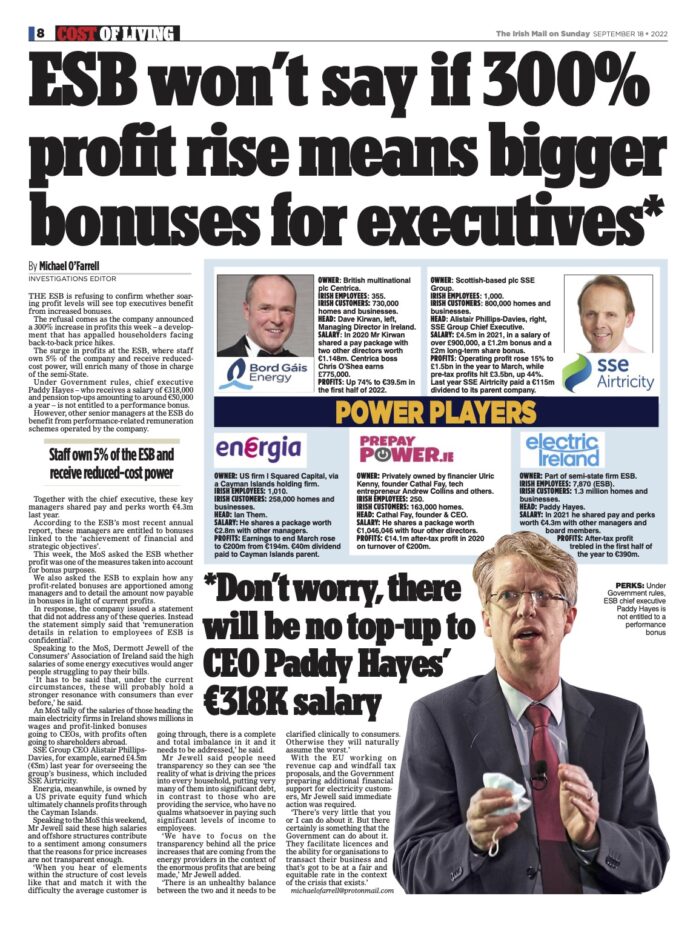THE ESB is refusing to confirm whether soaring profit levels will see top executives benefit from increased bonuses.
The refusal comes as the company announced a 300% increase in profits this week – a development that has appalled householders facing back-to-back price hikes.
The surge in profits at the ESB, where staff own 5% of the company and receive reducedcost power, will enrich many of those in charge of the semi-State.
Under Government rules, chief executive Paddy Hayes – who receives a salary of €318,000 and pension top-ups amounting to around €50,000 a year – is not entitled to a performance bonus.
However, other senior managers at the ESB do benefit from performance-related remuneration schemes operated by the company.
Together with the chief executive, these key managers shared pay and perks worth €4.3m last year.
If you have information about wrongdoing at energy companies contact michaelofarrell@protonmail in complete confidence.
According to the ESB’s most recent annual report, these managers are entitled to bonuses linked to the ‘achievement of financial and strategic objectives’.
This week, the MoS asked the ESB whether profit was one of the measures taken into account for bonus purposes.
We also asked the ESB to explain how any profit-related bonuses are apportioned among managers and to detail the amount now payable in bonuses in light of current profits.
Remuneration details in relation to employees of ESB is confidential
ESB Spokesperson.
In response, the company issued a statement that did not address any of these queries. Instead the statement simply said that ‘remuneration details in relation to employees of ESB is confidential’.
Speaking to the MoS, Dermott Jewell of the Consumers’ Association of Ireland said the high salaries of some energy executives would anger people struggling to pay their bills.
‘It has to be said that, under the current circumstances, these will probably hold a stronger resonance with consumers than ever before,’ he said.
An MoS tally of the salaries of those heading the main electricity firms in Ireland shows millions in wages and profit-linked bonuses going to CEOs, with profits often going to shareholders abroad.
SSE Group CEO Alistair Phillips-Davies, for example, earned £4.5m (€5m) last year for overseeing the group’s business, which included SSE Airtricity. Energia, meanwhile, is owned by a US private equity fund which ultimately channels profits through the Cayman Islands.
Speaking to the MoS this weekend, Mr Jewell said these high salaries and offshore structures contribute to a sentiment among consumers that the reasons for price increases are not transparent enough.
‘When you hear of elements within the structure of cost levels like that and match it with the difficulty the average customer is going through, there is a complete and total imbalance in it and it needs to be addressed,’ he said.
Mr Jewell said people need transparency so they can see ‘the reality of what is driving the prices into every household, putting very many of them into significant debt, in contrast to those who are providing the service, who have no qualms whatsoever in paying such significant levels of income to employees.
We have to focus on the transparency behind all the price increases that are coming from the energy providers in the context of the enormous profits that are being made
Dermott Jewell of the Consumers’ Association of Ireland
‘We have to focus on the transparency behind all the price increases that are coming from the energy providers in the context of the enormous profits that are being made,’ Mr Jewell added.
‘There is an unhealthy balance between the two and it needs to be clarified clinically to consumers. Otherwise they will naturally assume the worst.’
With the EU working on revenue cap and windfall tax proposals, and the Government preparing additional financial support for electricity customers, Mr Jewell said immediate action was required.
‘There’s very little that you or I can do about it. But there certainly is something that the Government can do about it. They facilitate licences and the ability for organisations to transact their business and that’s got to be at a fair and equitable rate in the context of the crisis that exists.’




